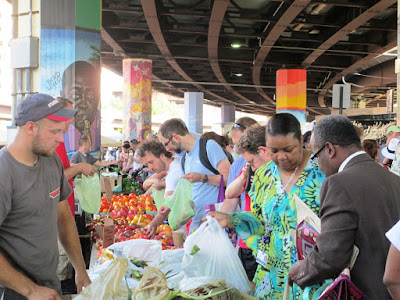 |
| One would never guess what is sold here: Coffee capsules |
The Nespresso coffee boutique is half museum, half jewelry store, a blend that Apple introduced for its own stores some time ago. The concept is applied here for the mundane product of coffee cartridges, available in many flavors. The cartridges are a current fad. They can be pushed into a machine to either create espresso, cappuccino or cafe latte with the push of a button.
Rest-stops, some hotels or similar public spaces have had similar machines for some time, but those machines sat next to the coke dispenser and were no more glamorous than soda machines. But coffee has become the trademark for our accelerated pace. Neatly designed compact versions of the coffee machines sit on kitchen countertops of hipsters or in the office nooks of architects.
The Nespresso boutique has taken the trend to its pinnacle in shops around the globe turning a place to buy the cartridges into a cult shop which displays the cylinders that contain the capsules in wall shelves like precious books in a library. The display reminded me of the progressive German publisher Suhrkamp who in the seventies sold all his paperbacks in a range of rainbow colors. The complete series lined up just so in the book-store always wanted you to buy more to get a similar effect at home. The cartridge, conceived as a tool to make more money with coffee powder and sell the concept as convenience, tracks the trajectory of much what is going on with shopping in general: Wasteful packaging, high prices, excessive specialization, exclusive clientele. The concept also sells convenience through its simplified transaction: The shopper places the desired flavors in a bag, the bag gets briefly placed into a centrally located scanner which somehow can recognize all the items in the bag without problem, a prepaid buyer's chip card deducts the cost and voila, the purchase is complete. Compared to that high tech feat Amazon's new experimental Go store without check-outs relying on access turnstiles and cameras to identify the purchases seems almost quaint. (Amazon's Checkout-Free Store Makes Shopping Feel Like Shoplifting, The Atlantic).
 |
| old style shopping: Baltimore farmers market |
Of course, bulk food such as two Fuji apples which cost $1.49 per pound and which don't bear a bar code remain the check-out problem that stumps some check out staff and especially shoppers in the self check-out lane. Fruit is one of those items which remain to be most efficiently sold at a farmers market.
Amazon Go, Apple stores and Nestle's Nespresso Boutiques are pilots of what will happen in retail. Whatever comes out of future shopping will shape cities. Will people buy their goods online by browsing them virtually with 3D goggles for home delivery by drone or will they hop from one specialty boutique to another to get their goods in style? Will they prefer Old World over-the-counter personal contact style shopping as one can find in butcher stores and bakeries in Paris and Rome which seem to have a renaissance with US hipsters?
It seems nobody knows. The only thing that is sure right now is that retail is under threat, sees turnover, closures and mergers in unprecedented speed and scale and that new prototypes come and go faster than one can blink an eye. Pundits call the indoor mall dead (except where some urban and some suburban versions still flourish), big-box passe (except for Walmart and Sams Club?) and food-markets in.
 |
| Amazon GO experimental shop |
The best bet would be to look out for shopping that allows experiences. Whatever people want to do, in the city of tomorrow, it has to be memorable and enriching in some way, it seems.
Meanwhile, cities and retail haven't even come to terms with the most mundane task: How to provide access to shopping, services and fresh food for all.
Food deserts stubbornly exist, even if new terms have been coined. The Nespresso Boutique or Amazon Go seem to do little to change that. Online shopping and immediate delivery hold more promise, but only if the prices don't become as stratospheric as those for he coffee cartridges.
Klaus Philipsen, FAIA
The grocery stores in the region rank as follows (BBJ)
1
Giant Food LLC
Landover, MD 20785
Safeway Inc.
Lanham, MD 20706
3
CVS Caremark
Woonsocket, RI 02895
4
Harris Teeter Inc.
Matthews, NC 28105
5
Shoppers Food & Pharmacy
Bowie, MD 20715
No comments:
Post a Comment